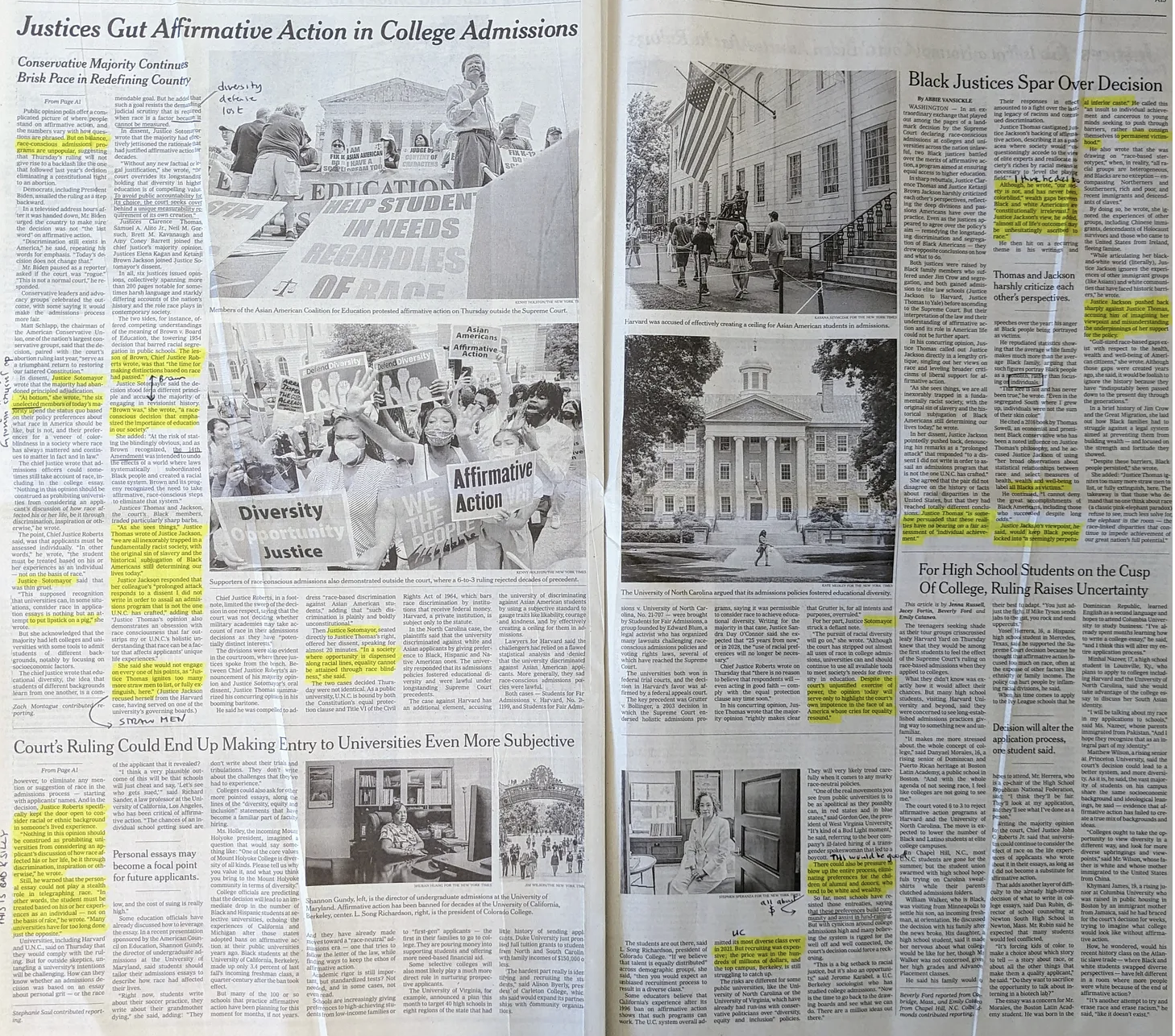Guest editor Tony Johnston shares great articles on Mariachi music healing, undercover cops scheming, “wokeness” criticizing, and Spelling Bee championing
I’m very excited to announce that this is the first-ever special guest issue. In just a moment, I’ll turn it over to my close friend (for 20+ years!), educator extraordinaire, literacy expert, big reader, and ardent Article Clubber Tony Johnston.
But first, one quick thing: Last week was The AI Issue, where I challenged you to figure out which article blurbs I wrote vs. which ones ChatGPT wrote. Let’s take a look at how you voted.
I’m happy to reveal that the answer is 1 & 3 and that nearly half of you got it correct. Great work! But is this a good or a bad thing? Does this mean that AI is fairly good at writing like me, or does this mean that I write sorta like an AI? 😀 Anyway, much food for thought, and most importantly, thank you very much for playing.
Now on to this week’s issue! You’re in very good hands with my good friend Tony. Way back when, we taught ninth grade Humanities together, and since then, he’s gone off to do amazing things as a professor of education in West Hartford. His work focuses on adolescent literacy and supporting youth of color in schools. Plus he’s a smart and funny guy, and I’m confident you’ll enjoy his article selections. Let’s get to it.
Hi, my name is Tony and I am not an AI — or am I? I am the guest editor for this week’s issue of Article Club. I am glad you are here and I hope you enjoy the 403rd edition!
It was exciting and humbling that Mark invited me to assemble this offering of articles. In working to compile these pieces I was struck by just how much time and reading Mark must do in order to get us three or four great pieces, and I encourage others to guest edit if only to go down the rabbit holes Mark navigates so well.
Like many of you, I look forward to the timely offering of Article Club each Thursday. If you are like me, you don’t always get a chance to read all (any?) of the articles, but just seeing Mark’s thoughtful blurbs about each piece, his welcoming tone, and gentle invitation to participate in a reading community brings feelings of comfort. It’s similar to the packages of Top Ramen and hot cocoa mix in my cupboard which, like Mark’s articles, often remain unopened — it’s just good to know they are there.
The articles selected for this week reflect my effort to emulate Mark’s deft ability to provide us with pieces that are timely, without being heavy handed or redundant. With this in mind, I avoided articles that discuss AI or ChatGPT, billionaire feuds, or the SAG-AFTRA strike.
This week’s lead article introduces you to meet an undercover Chicago cop investing crooked coppers; next we meet a Mariachi music teacher in Uvalde; after that we have a scathing critique of liberal perspectives; and the last piece celebrates an unlikely winner of the nation’s first Spelling Bee!
As a guest editor I have the privilege of asking a question of my fellow readers, a chance to learn a bit more about the other 1,000+ subscribers who welcome this weekly pearl to their inbox. Because I do research on how people engage in literacy activities, I’d love to learn which description best reflects your reading habits. Plus, polls are fun.
Thanks for playing! I count myself as mostly a reader of fiction, but also — who has time to read? Luckily for us, Mark does! Now let’s get to this week’s articles.
1️⃣ The Gutsy Undercover Cop Who Took Down Chicago P.D.’s Most Crooked Crew
I recently finished Small Mercies by Dennis Lehane, a work of fiction about Boston during the 1974 school desegregation chaos, the Boston mafia, and one pissed off mama. I recommend it. Reading begets reading — and this week’s lead article is without question informed by my reading of Lehane and my love of thrillers. It is a suspenseful and well-written long read (40 minutes) by David Harris about Black Chicago cops going undercover to uncover corruption, only to be undermined when the cops they busted stopped looking like them.
His real identity was even more unfathomable — and the corrupt cops who had just shaken him down had no idea what was coming for them.
2️⃣ How a High School Mariachi Team Triumphed in Uvalde
The tragedy and inaction to stop the shooter who killed 19 children and two teachers at Robb Elementary School in Uvalde occurred just over a year ago. Feelings of anger, grief, and numbness readily returned as I reviewed articles and news footage commemorating the anniversary. Then, I found our second article, by Julyssa Lopez, which is less about the tragedy and more one that celebrates the teachers, art in the schools, the resiliency and leadership of teenagers, and the Mariachi music helping to heal this small town of 15,000. This is the sort of read that allows us to heal, and to celebrate the heroes and small victories in spaces where the unfathomable overwhelms.
When Martinez started at Uvalde High, a lot of his students didn’t take the music seriously. Within two years, they’d become the pride of Uvalde, during a wrenching time.
When you are the guest editor, you can add your own pets. Here our dogs Tucker and Primo, who are giving me that “do you mind?” look!
3️⃣ Doing the Work
From time to time, we can count on Article Club to provide readings that cause a sense of dissonance, and in that spirit our third article is a scathing critique of liberal views and makes the case that “woke” is the new Protestantism. As a Bay Area product now living in the Nutmeg state — where the influence of those early Puritan values echo still — I was struck by the following analogy by the author, Ian Buruma:
It was the “spirit of hard work” that characterized those striving to meet the Protestant goal of ethical perfection. This could be interpreted literally, as the work of accumulating wealth through honest labor. But this labor, and its material fruit, go together with the spiritual work of moral improvement. There are clear contemporary parallels in what theorists of antiracism call “doing the work,” which functions as both a sign of one’s current enlightenment and of his or her commitment to continuous and endless self-improvement.
If you can stomach the white tears by the author about his own experience being “canceled” and the conservative talking points of the familiar reductionist claims about the increasingly tenuous term of “woke,” give it a shot! The commentary about the shifting agenda of the Left from the 1960s to today certainly merits consideration.
4️⃣ When She Won the First National Spelling Bee, Marie C. Bolden Dealt a Blow to Racism
The first Spelling Bee in the US was 115 years ago, and our final article discusses the surprising winner, Marie C. Bolden, and her untold story. Bolden not only wins with a perfect score and a gold medal she kept hidden from her own family, but does so in the face of racism and prejudice (one of the words that was actually included as part of that initial competition).
Big gratitude to Tony for guest editing this issue. Thank you for bringing us four outstanding, thought-provoking articles. And for being the first-ever guest editor. It’s a big deal! (Plus, Tony’s an astute reader: not everyone knows I’m a huge fan of mariachi and spelling bees.) Article Clubbers, please feel free to leave a comment to share your appreciation for Tony’s contribution. (And let me know if you’d like to guest edit someday!)
To our 3 new subscribers — including Paris and Devron — I hope you find the newsletter a solid addition to your email inbox. To our long-time subscribers (Opal! Oakley! Oliver!), you’re pretty great, too. Loyal reader Fern, thank you for sharing the newsletter and getting the word out.
If you like Article Club, please help it grow. I really appreciate your support. Here are two ways you can help out:
📬 Invite your friends to subscribe. Know someone who’s kind, thoughtful, and loves to read? I’d love it if you encouraged them to subscribe. Word of mouth is by far the best way to strengthen our reading community. Thank you for spreading the word.
❤️ Become a paid subscriber, like Veronica (thank you!). You’ll join an esteemed group of readers who value Article Club. Plus you’ll gain access to our monthly discussions, our monthly quiet reading hours, and my personal audio letters from me to you. It’s $5 a month or $36 a year.
On the other hand, if you no longer want to receive this newsletter, please feel free to unsubscribe. See you next Thursday at 9:10 am PT.
























